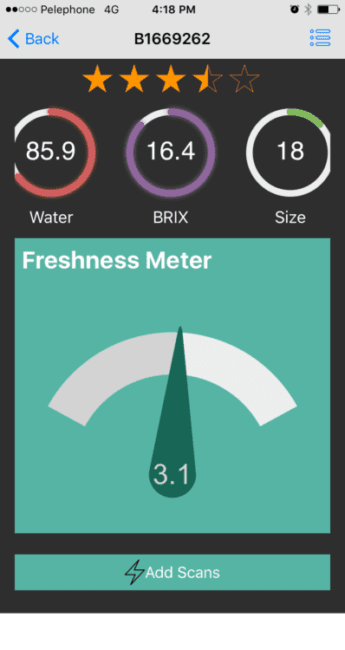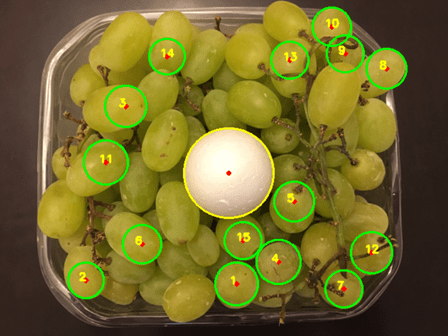AclarTech – The End of Fruit Squeezing as We Know It
Agritech
How great would it be if you could tell unquestionably how good a piece of fruit was, how juicy and sweet it would taste, how long it would last in your refrigerator, and whether you were getting real value for your money just by looking at it?
When Avi Schwartzer wanted to know when he should pick the mangos off his backyard tree, he found that no one could give him any definitive advice. Other than general, vague, and unfounded apocryphal suggestions (“squeeze it, pinch it, tap it”), he discovered that there was no conclusive answer to this conundrum that was based on fact, scientific research, or any genuine knowledge. The responses to his initial query – or lack thereof – inspired Schwartzer to dig deeper, only to discover to his amazement that there is no global standard for regulating when fruit is ripe enough to be picked.
The Fruit-Checking Game-Changer
 This jaw-dropping fact was the catalyst for Schwartzer and his co-founder Ruby Boyarski to create their unique new solution: AclaroMeter. A real game-changer in
This jaw-dropping fact was the catalyst for Schwartzer and his co-founder Ruby Boyarski to create their unique new solution: AclaroMeter. A real game-changer in
the fruit-checking game, AclaroMeter is a mobile app that accurately monitors and analyzes fruit quality, ripeness and freshness. It reads the internal properties of the fruit (sugar, acidity, firmness, etc.) and uses image processing to rapidly and accurately identify its external properties (size, color, marks, etc.), taking less than one minute to sample more than 30 individual pieces and instantly show the results. The innovative app is enabled by a new pocket sensor produced by Israel Consumer Physics Ltd, and a mobile phone camera, and is intended to replace all manner of individual niche solutions, such as color charts, acidity checkers, refractometers, meter rings and basic visual scrutiny – all slow, tedious, labor-intensive, only for individual pieces of fruit, and wildly inaccurate.When You Really Know Your Onions Fruit
Knowing when the fruit is ripe and ready for harvest, not to mention the quality of the produce, is extremely important to the fruit industry supply chain – a group comprising everyone in the farm-to-table process: farmers, wholesalers, vendors, and consumers. By accurately knowing the ripeness and quality of the produce, the fruit can be harvested at the optimal time, as well as being priced accurately at each stage of the farm-to-table process – which is good news for everyone, especially the consumer. However, where once farmers and growers would rely on season change to indicate time to harvest, the mercurial nature of the climate and the erratic weather conditions brought on by global warming have ended the credibility of this technique once and for all. When projected onto a broad agricultural scale, this issue translates into a huge problem. In fact, worryingly high percentages of fruit produced globally are wasted due to the inaccuracy of when they are harvested.
Let Us “Claro-fy” That
The name AclarTech stems from the Latin word “claro” – meaning to clarify, make transparent, reveal – mirrors the ethos of the company: achieving transparency regarding the quality of the produce. Working closely with the Israeli Ministry of Agriculture, AclarTech aims to make the entire agricultural industry more efficient by enabling levels of accuracy hitherto unknown in terms of time to harvest and quality of produce. AclaroMeter is already in use by fee-paying customers, including the largest local wholesalers of grapes and wines, with larger pilot schemes planned to roll out over the coming months, across the world.

Making it Personal
According to Schwartzer, AclarTech’s projected long-term plans are to change the entire nature of the consumer experience with regard to purchasing fresh produce, which currently suffers from a lack of trust between retailers and consumers. Given that the purchase of fruit and vegetables is highly individual – the level of quality, the size, the shape, the feel, the smell, the taste are all personal choices – AclarTech want to offer the consumer on the street 100% assurance of the quality of the fruit they buy, and create an as yet non-existent common standard of quality between growers, wholesalers, retailers, and consumers.
 Tech Ecosystem
Tech Ecosystem Human Capital
Human Capital Focus Sector
Focus Sector Business Opportunities
Business Opportunities Investment in Israel
Investment in Israel Innovation Diplomacy
Innovation Diplomacy Leadership Circle
Leadership Circle Our Story
Our Story Management Team
Management Team Careers
Careers